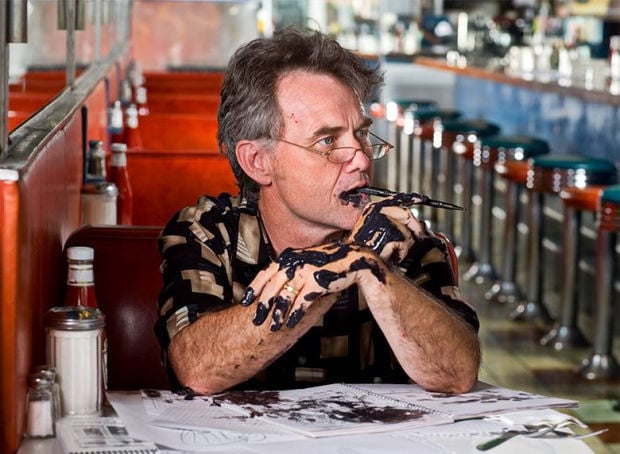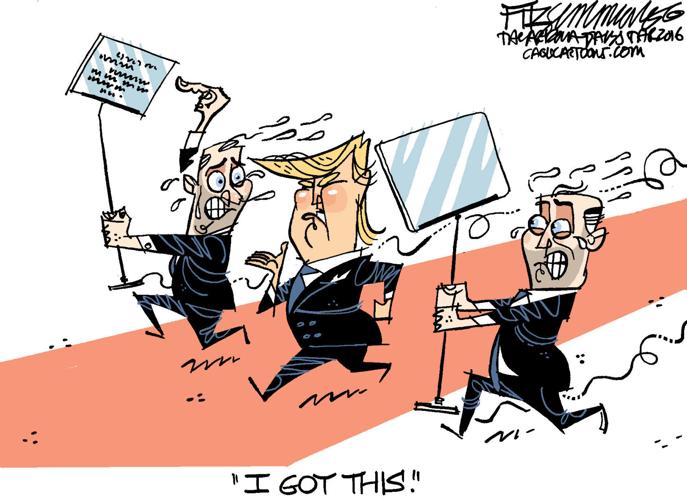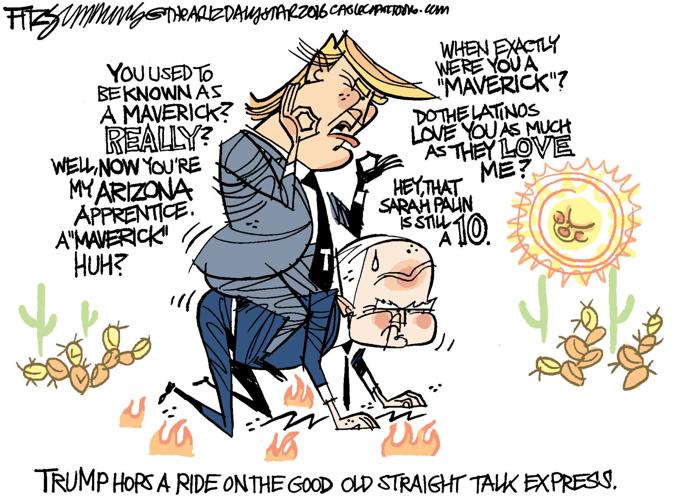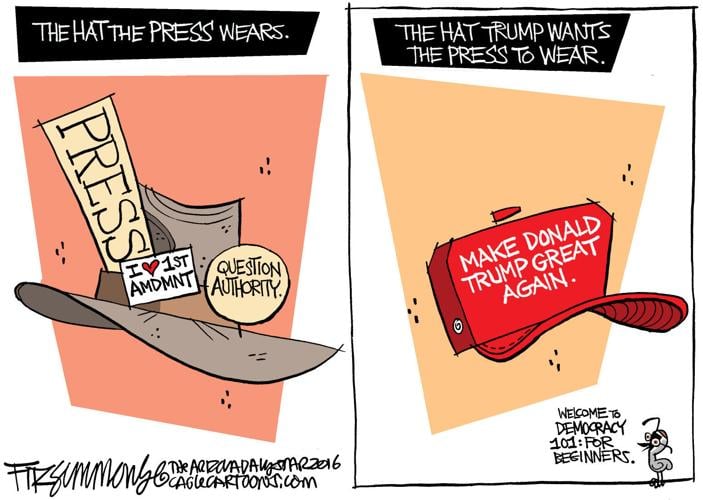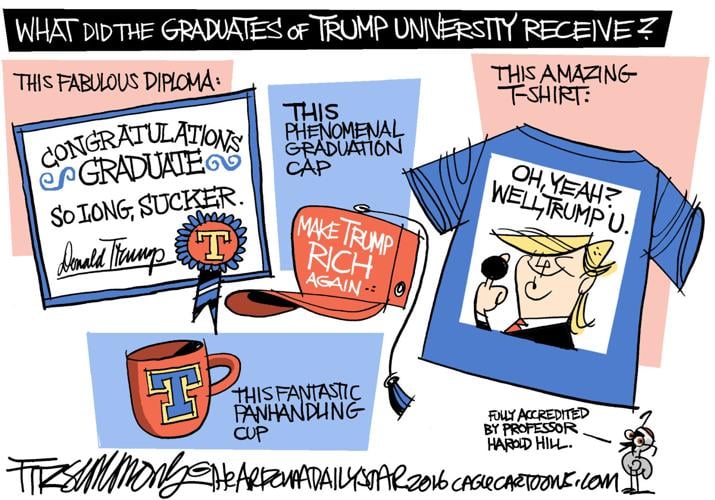When 96-year old Mr. Tanaka shuffled into the Pita Hut, a neighborhood cafe, it was for Turkish coffee and the company of the cafe’s owner, his equally ancient friend, Ibrahim. The other regulars always got up to help the unsteady Mr.Tanaka negotiate the door with his walker, which seemed to be always entangled with the red leash of old Yoko, a yipping, skittering tiny white dog that resembled a wind up mechanical toy.
On this day, Ibrahim brought stuffed grape leaves and tabbouleh to his friend and joined him in his booth. Old Ibrahim had bushy white hair and a thick white mustache that made him look like a Lebanese Mark Twain. On the small TV, by the cash register, their new president was speaking. If you dared to challenge the constitutionality of the president’s ban on Muslims you were “a traitor” and “no better than the terrorists themselves.”
Mr. Tanaka scowled. “Ibrahim, I am sorry about this. How is your family?”
Ibrahim shook his head. “We’ll cope.”
Around the world American citizens, like Ibrahim’s eldest son, a pediatrician, were stopped from boarding flights home. “Muslims are not allowed back into the United States. See the American embassy.”
Ibrahim’s daughter, a kind and soft-spoken software engineer, texted her father. “Silicon Valley’s brain drain will be bad. :( ”
Ibrahim’s sister, a nurse, and a proud naturalized American, lived in fear she’d lose her teenage son to radicalization, and oblivion, in far away Syria.
Ibrahim’s brother, a 20-year veteran of the police department, and a decorated reservist, felt betrayed by his country. He kept it to himself and did his job.
Ibrahim’s brilliant nephew, Mohammed, dreamed of leaving Beirut to study microbiology here. “America is Number One!” Like thousands of other Muslim students he was asked to go elsewhere.
Ibrahim shook his head in despair.
The next day, on the little television, Ibrahim and Mr. Tanaka watched Turkey, Kuwait and Qatar struggle to quell riots outside of our American bases. Billions of dollars in tourism revenues dried up. Pakistan, Jordan and Indonesia pulled their ambassadors. Tehran announced it would toss our treaty and begin developing an atomic arsenal. And unleash Hezbollah.
The next mass shooting followed a familiar pattern. A disturbed loser, who had never read the Quran, bought a semi-auto and texted, “For ISIS.”
Ibrahim cringed through the nightly news. Every time there was a mass shooting Ibrahim prayed, “Please, don’t let the killer be a Muslim.”
Encouraged by their new president’s careless remarks, thugs bullied their Muslim neighbors. Bomb threats and broken windows became commonplace. Cafes like Ibrahim’s were closing.
In 1915 the café was built by a happy German immigrant named Hans Hartz. When the "War to end all wars" commenced, Mr. Hartz, a newcomer blessed with the inability to lose his thick native accent, became the object of town gossip suggesting he was a murderous "Hun", a sinister agent "of the Kaiser". After the graffiti and the vandalism he sold the cafe.
A century later, Mr. Tanaka still came to Ibrahim's cafe every day. Even as the customers stopped coming.
American mosques were burned. Innocent Muslim women wearing the hijab were assaulted. Restaurants refused service to innocent American families who were Muslin. In one city, an innocent Muslim and American boy was beaten to death. Mistaken for Muslims, a family of innocent Sikhs were murdered in broad daylight. Innocence meant nothing.
Still another mass shooting. With a claim of “ISIS” allegiance. The president recklessly suggested mass deportations and walled ghettos could be the answer. “I like walls.”
Even if you had been a good citizen like old Ibrahim, even if you had voted, paid your bills, prayed five times a day, been a Boy Scout, served on charity boards, volunteered at your kids’ schools, and served in wartime you were eyed with suspicion by the ignorant who were lusting for vengeance.
Muhammad Ali’s memorial was defaced with slurs. Americans, calling for deportation, ghettos and extermination, paraded down our Main Streets with banners, torches and nooses.
Christian pastors chastised their parishioners, reminding them when the other children of Abraham were singled out for mass exclusion. Pews emptied. Pastors were replaced as fast as broken stained glass windows.
At the same moment Rabbi Rosenbaum showed his congregation the yellow star his grandfather was ordered to wear, Ibrahim was washing dishes and wondering when he would be ordered to wear the crescent moon.
United by a collective rage, every Hezbollah, Hamas, ISIS and al-Qaida sociopath had turned their bloodlust westward, to an enemy that had declared their religion foul.
“At last,” lamented Ibrahim to Mr. Tanaka, “America brought the entire Middle East together.”
More lone wolf attacks yielded a harvest of more blind rage. Ibrahim was threatened; his windows smashed.
Mr. Tanaka’s hands shook as he spoke into his coffee cup. “Ibrahim, you are such a good man. In our country any jackass can lob a brick or buy a gun.”
“I’m closing the cafe, Mr. Tanaka.”
Mr. Tanaka tearfully looked at the small American flag he had duct taped to his walker. The old man could barely speak. “Ibrahim, I remember turning 15. That was the year we were rounded up and herded into camps. If you had Japanese blood you were …not to be trusted. My father lost everything. The farm. Our house. My poor mother lost her mind.”
Mr. Tanaka patted his friend’s old wrinkled hand. “God be with you, Ibrahim.”
“And may Allah bless, and keep you, Mr. Tanaka.”


